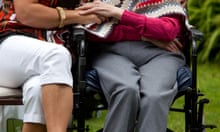The pain cuts through Davina Ware’s voice as she describes her experience of carer’s allowance, the meagre weekly benefit given to those heralded by the government as Britain’s “unsung heroes”.
She feels “humiliated,” “devastated,” and “treated like a conniving thief” by the Department for Work and Pensions (DWP) since she received its demand, three months before her retirement, to repay nearly £4,000.
Her crime? She calculated the earnings of her part-time zero-hours council job as a monthly income, as she believed the DWP required, rather than as a four-week cycle. For this infraction she had to pay back four years’ worth of carer’s allowance. A grand total of £3,852.09.
“I was looking forward to retirement and then this – out of the blue. It’s put a shadow over my life,” she says, tearfully.
Ware’s husband, Mike Ware, 72, has lived with Parkinson’s for 20 years but it has become more advanced in recent years.
Her experience is one that will be recognised by many of the UK’s 5 million unpaid carers: “You live in somebody else’s life. Somebody asked what my date of birth was recently and I gave them his instead of mine.
“That’s how much it takes over your life,” she says. “It’s like having a little tiny baby but they never grow up – it’s going the other way.”
Despite the trauma of the last decade – the couple also lost three parents in a short period – Ware’s biggest regret is taking on carer’s allowance in July 2016, more than a decade after her husband of 40 years was diagnosed with Parkinson’s.
She applied for the benefit, then £62.10 a week, thinking it would help make ends meet. She returned to work in September 2017 on a zero-hours contract, meaning she could manage her shifts around Mike’s care.
Ware, 66, from Bath, says she was told by a DWP official in the Carer’s Allowance Unit that she could average out her monthly income to ensure she was within the £116-a-week limit at the time.
She double-checked the advice online to be sure. But in March last year, a letter from the DWP outlined her costly mistake.
When she replied to question the penalty, the DWP sent back a list of the weeks where she had inadvertently earned more than the threshold; one week was when she unexpectedly received sick pay during Covid (the DWP later agreed to waive that week’s fine).
Her encounter with Britain’s welfare state has shaken not just her sense of self, but her faith in the government: “It’s the whole way that it’s handled. Neither of [the DWP letters] were done in a nice way. There’s no apology. There’s nothing to say we’re sorry it’s taken us over four years to inform you.
“They’re very unsympathetic. I don’t think they understand what it’s like for people on benefits.”
Ware’s penalty came four years after DWP officials promised MPs that it was “well on the way” to preventing unpaid carers from running up huge overpayments, after a damning report by a parliamentary committee.
“You know that somewhere along the line their system is wrong and we’re the ones paying the price. They’ve had since 2019 to pull their socks up and they’ve done nothing,” she says.
Ware is now paying back £40 a month – the most she and her husband can afford – but the psychological impact of her treatment has been far greater.
“They have treated me as if I am a conniving thief, not someone that has struggled looking after three parents and my husband for 12 years,” she says, adding through tears: “And I don’t know whether anyone believes me at all. I’ve lost all confidence. I’ve been stupid but, good God, why didn’t they tell me about it before and I could have done something about it?”
A DWP spokesperson said a carer’s allowance had increased by about £1,500 for an unpaid carer since 2010. This works out as a rise of about £28 a week, or slightly higher than the rate of inflation.
They added: “We are committed to fairness in the welfare system, with safeguards in place for managing repayments, while protecting the public purse.
“Claimants have a responsibility to consistently inform DWP of any changes in their circumstances that could impact their award, and it is right that we recover taxpayers’ money when this has not occurred.”








